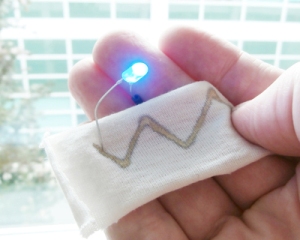Oct 6 2014
The National Physical Laboratory (NPL) has won a Knowledge Transfer Partnership (KTP) award from Innovate UK and will be partnering with Coventry University to work in the area of smart textiles.
 Zigzag conductive track
Zigzag conductive track
The award brings together NPL's Electrical Interconnection Group and Coventry's Functional Materials Team to look at additive techniques for applying conductive tracks to a range of textiles. There are numerous applications for the work across the wearable technology sector, for example within health, sport and the military.
There are already methods to produce conductive textiles, such as weaving a conductive yarn into the material or by printing conductive inks onto the fabric surface. However, it is more advantageous to treat the fabric in such a way as to introduce conductivity onto the individual fibres within the textile. A key goal will be selective metallisation of the textile, i.e. the incorporation of conductive tracks into the textile rather than coating the whole surface, which could lead to circuit designs being incorporated into clothing.
The process of depositing nanoparticulate silver onto fibres has already been developed by NPL, with the resulting fabrics demonstrating excellent coverage of silver and conductivity, whilst retaining the necessary flexibility for textile applications. The next step in the additive process will use the metallisation expertise at Coventry University to thicken the conductive layer and develop a robust prototype.
There are many factors to consider when working with smart textiles, for example, the texture of the treated material and also its lifetime; how well will it survive repeated washing cycles? The chemistry of each fabric is also a factor since the differences between natural and synthetic fabrics results in different responses to the conductivity treatments.
Kathryn Wills, KTP Project Associate, said:
"This is a fantastic opportunity to be working on smart textiles and with the ultimate focus on conductive tracks, rather than whole surface coating, there is a real opportunity to see electronics being more easily integrated into clothing in the near future, which has the potential to be really influential in the healthcare and sports industries."
A KTP is a collaborative initiative between a company and a university, which shares knowledge and expertise for an innovative research project with a clear commercial objective. The project benefits from combining academic input with the business know-how to develop successful IP and contribute to company growth.